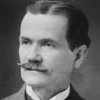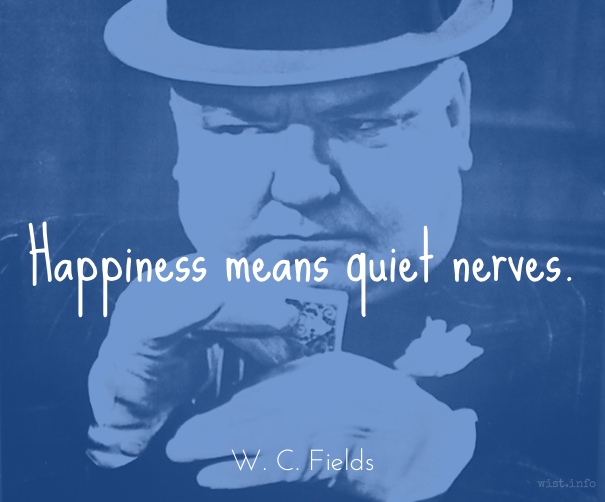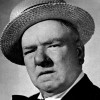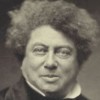We must try to keep the mind in tranquility. For just as the eye which constantly shifts its gaze, now turning to the right or to the left, now incessantly peering up and down, cannot see distinctly what lies before it, but the sight must be fixed firmly on the object in view if one would make his vision of it clear, so too man’s mind when distracted by his countless worldly cares cannot focus itself distinctly on the truth.
Basil of Caesarea (AD 330-378) Christian bishop, theologian, monasticist, Doctor of the Church [Saint Basil the Great, Ἅγιος Βασίλειος ὁ Μέγας]
Letter to Gregory of Nazianzus (c. AD 358) [tr. Defarrari (1926)]
(Source)
Quotations about:
calm
Note not all quotations have been tagged, so Search may find additional quotes on this topic.
We take all things in a minor key as we grow older. There are few majestic passages in the later acts of life’s opera. Ambition takes a less ambitious aim. Honor becomes more reasonable and conveniently adapts itself to circumstances. And love — love dies. “Irreverence for the dreams of youth” soon creeps like a killing frost upon our hearts. The tender shoots and the expanding flowers are nipped and withered, and of a vine that yearned to stretch its tendrils round the world there is left but a sapless stump.
Jerome K. Jerome (1859-1927) English writer, humorist [Jerome Klapka Jerome]
Idle Thoughts of an Idle Fellow, “On Being In Love” (1886)
(Source)
The quoted line is from Longfellow, "The Ladder of St. Augustine."
Blessed is he who has succeeded in learning the laws of nature’s working, has cast beneath his feet all fear and fate’s implacable decree, and the howl of insatiable Death.
[Felix, qui potuit rerum cognoscere causas,
atque metus omnis et inexorabile fatum
subiecit pedibus strepitumque Acherontis avari.]Virgil (70-19 BC) Roman poet [b. Publius Vergilius Maro; also Vergil]
Georgics [Georgica], Book 2, l. 490ff (2.490-492) (29 BC) [tr. Fairclough (Loeb) (1916)]
(Source)
(Source (Latin)). Alternate translations:
Happie is he that hidden causes knowes,
And bold all shapes of danger dares oppose:
Trampling beneath his feet the cruell Fates,
Whom Death, nor swallowing Acheron amates.
[tr. Ogilby (1649)]
Happy the Man, who, studying Nature's Laws,
Thro' known Effects can trace the secret Cause.
His Mind possessing, in a quiet state,
Fearless of Fortune, and resign'd to Fate.
[tr. Dryden (1709), l. 698-701]
Happy the Man, whose penetrating mind
Of things the latent causes first could find,
He, who all terrors, ruthless Fate could quell,
And the dire din of all-devouring Hell!
[tr. Nevile (1767), l. 549-552]
How blest the sage! whose soul can pierce each cause
Of changeful Nature, and her wondrous laws:
Who tramples fear beneath his foot, and braves
Fate, and stern death, and hell's resounding waves.
[tr. Sotheby (1800)]
Happy is he who has been able to trace out the causes of things, and who has cast beneath his feet all fears, and inexorable Destiny, and the noise of devouring Acheron!
[tr. Davidson (1854)]
Thrice blest the man whom mighty genius brings
To know the cause and origin of things:
Beneath his feet lie destiny and dread;
He walks the roaring waters of the dead.
[tr. Blackmore (1871)]
Happy the man who has won the knowledge of the moving springs of nature, and so trmapled under food all fears, and the remorseless doom of death, and the road of Acheron, yawning for prey!
[tr. Wilkins (1873)]
Happy, who had the skill to understand
Nature's hid causes, and beneath his feet
All terrors cast, and death's relentless doom,
And the loud roar of greedy Acheron.
[tr. Rhoades (1881)]
Happy the man who knows the secret cause,
How nature works, and reads creation’s laws,
Whose soul to fortune can superior rise,
And death, dark minister of fate, despise.
[tr. King (1882), ll. 498-501]
Happy is he who has been able to trace out the causes of things, and who has trodden under foot all idle fears, and inexorable Destiny, and the roar of devouring Acheron!
[tr. Bryce (1897)]
Happy he who hath availed to know the causes of things, and hath laid all fears and immitigable Fate and the roar of hungry Acheron under his feet.
[tr. Mackail (1899)]
Oh happy, whose heart hath attained Creation's secret to know,
Who hath trampled all haunting fears underfoot, nor dreadeth the blow
Of Fate the relentless, the roar of insatiate Acheron's flow!
[tr. Way (1912)]
Blest was that man whose vision could explore
The world's prime causes, conquering for man
His horde of fears, his certain doom of death
Inexorable, and the menace loud
Of hungry Acheron!
[tr. Williams (1915)]
Lucky is he who can learn the roots of the universe,
Has mastered all his fears and fate's intransigence
And the hungry clamour of hell.
[tr. Day-Lewis (1940)]
Blessed is he who masters nature’s laws,
Tramples on fear and unrelenting fate,
On greedy, roaring Acheron.
[tr. Bovie (1956)]
Happy the man who has been able to learn the causes of things and has trampled beneath his feet all fears, inexorable fate, and the howl of greedy Acheron.
[tr. Miles (1980)]
Blessed is he whose mind had power to probe
The causes of things and trample underfoot
All terrors and inexorable fate
And the clamour of devouring Acheron.
[tr. Wilkinson (1982)]
He who’s been able to learn the causes of things is happy,
and has set all fear, and unrelenting fate, and the noise
of greedy Acheron, under his feet.
[tr. Kline (2001)]
Blessed, he who understands the workings of nature
and tramples all fear and relentless fate and the bone-
shaking clatter of greedy Death beneath his feet.
[tr. Lembke (2004)]
O happy he who can fathom the causes of thing,
who's thrown all fear and dogged Fate
beneath his feet, and the roaring of ravenous Acheron.
[tr. Johnson (2009)]
That man is blessed who has learned the causes of things,
And therefore under his feet subjugates fear
And the decrees of unrelenting fate
And the noise of Acheron's insatiable waters.
[tr. Ferry (2015)]
The wise man preserves a smooth-tempered self-control.
[πρὸς σοφοῦ γὰρ ἀνδρὸς ἀσκεῖν σώφρον᾽ εὐοργησίαν.]
Euripides (485?-406? BC) Greek tragic dramatist
Bacchæ [Βάκχαι], l. 641ff [Dionysus/Διόνυσος] (405 BC) [tr. Vellacott (1973)]
(Source)
An ironic statement from Dionysus, of how he will keep his calm and temper in the face of Pentheus' disrespectful fury. In very short order, Dionysus is (calmly) setting up Pentheus' self-destruction through the Bacchantes' frenzy.
(Source (Greek)). Alternate translations:
For it behoves the wise
To curb the sallies of outrageous ire.
[tr. Wodhull (1809)]
For it is the part of a wise man to practice restrained good temper.
[tr. Buckley (1850)]
’Tis easy to a wise man To practise self-command.
[tr. Milman (1865)]
For a wise man ever knoweth how to keep his passion down.
[tr. Rogers (1872)]
For ’tis a wise man’s way to school his temper into due control.
[tr. Coleridge (1891)]
For it is the wise man's part to rein his wrath in soberness.
[tr. Way (1898)]
For still are the ways of Wisdom, and her temper trembleth not!
[tr. Murray (1902)]
Wise men know constraint: our passions are controlled.
[tr. Arrowsmith (1960)]
For it is the quality of a wise man to exercise restrained good temper.
[tr. Kirk (1970)]
The secret of life is
Balance, tolerance.
[tr. Soyinka (1973)]
A wise man should practice pure thought and good temper.
[tr. Neuburg (1988)]
A wise man knows restraint. His strength is his detachment.
[tr. Cacoyannis (1982)]
For the wise know gentleness is wisdom.
[tr. Blessington (1993)]
For it is the part of a wise man to employ a controlled and gentle temper.
[tr. Esposito (1998)]
A wise man trains his temper to be good and calm.
[tr. Woodruff (1999)]
Because a man
Who is wise has self-control and gentleness of temper.
[tr. Gibbons/Segal (2000)]
It is a wise man's part to practice gentleness and self-control.
[tr. Kovacs (2002)]
He who would be wise will keep his self-control.
[tr. Teevan (2002)]
That is how wise people work, calmly.
[tr. Theodoridis (2005)]
A wise man is able to hold his good-nature well tempered.
[tr. Valerie (2005)]
After all, a wise man ought to keep his temper.
[tr. Johnston (2008)]
He should learn from me the ways of self-control.
[tr. Robertson (2014)]
Keep calm and carry on, as the wisest say.
[tr. Pauly (2019)]
The wise man has a reasonable temper.
[tr. Behr/Foster (2019)]
A sophos man must practice good temper that is moderate [sōphrōn].
[tr. Buckley/Sens/Nagy (2020)]
I feel that art has something to do with the achievement of stillness in the midst of chaos. A stillness that characterizes prayer, too, and the eye of the storm. I think that art has something to do with an arrest of attention in the midst of distraction.
Possess your soul without fussing; your guardian angel does not lose half the sleep over you you think he does.
Austin O'Malley (1858-1932) American ophthalmologist, professor of literature, aphorist
Keystones of Thought (1914)
(Source)
If we spent half an hour every day in silent immobility, I am convinced that we should conduct all our affairs, personal, national, and international, far more sanely than we do at present.
Bertrand Russell (1872-1970) English mathematician and philosopher
“The Decay of Meditation,” New York American (1931-11-04)
(Source)
Laughter is a tranquilizer with no side effects.
Arnold H. Glasow (1905-1998) American publisher, humorist, aphorist
(Attributed (1974))
More discussion of this quotation: The Big Apple: “Laughter is a tranquilizer with no side effects”.
Wretchedness is caused by emotional disturbances, and the happy life by calmness, and disturbance takes two forms — anxiety and fear in expecting evils, ecstatic joy and lustful thoughts in misunderstanding good things, all of which are at variance with with wisdom and reason. Accordingly, if a man possesses self-control and consistency, and is without fear, distress, excitability, or lust, is he not happy? But this is the nature of the wise man always, so he is happy always.
[Atque cum perturbationes animi miseriam, sedationes autem vitam efficiant beatam, duplexque ratio perturbationis sit, quod aegritudo et metus in malis opinatis, in bonorum autem errore laetitia gestiens libidoque versetur, quae omnia cum consilio et ratione pugnent, his tu tam gravibus concitationibus tamque ipsis inter se dissentientibus atque distractis quem vacuum solutum liberum videris, hunc dubitabis beatum dicere? atqui sapiens semper ita adfectus est; semper igitur sapiens beatus est.]
Marcus Tullius Cicero (106-43 BC) Roman orator, statesman, philosopher
Tusculan Disputations [Tusculanae Disputationes], Book 5, ch. 15 (5.15) / sec. 43 (45 BC) [tr. Davie (2017)]
(Source)
(Source (Latin)). Alternate translations:
Now since the Disturbances of the Soul render the Life miserable, but the composure of them happy; and there is a double rank of Passions; in that, Discontent and Fear are terminated on Evils conceiv'd; but excessive Mirth and Lust arise from the misapprehension of good things, since all are inconsistent with Advice and Reason, if you shall see any one clear, emancipated, free from these emotions so vehement, so discordant one with the other, and so distracting, can you make any question of calling him Happy? But the Wise man is always so dispos'd, therefore the Wise man is always Happy.
[tr. Wase (1643)]
But as the perturbations of the mind make life miserable, and tranquility renders it happy: and as these perturbations are of two sorts; grief and fear, proceeding from imagined evils, immoderate joy and lust, from the mistake of what is good; and all these are in opposition to reason and counsel; when you see a man at ease, quite free and disengaged from such troublesome commotions, which are so much at variance with one another, can you hesitate to pronounce such a one a happy man? Now the wise man is always in such a disposition: therefore the wise man is always happy.
[tr. Main (1824)]
But when the perturbations render life unhappy, while their repose makes it happy -- and since the mode of perturbation is twofold -- sorrow and fear having birth from reputed evils -- the delirium of joy and desire, from the delusion of good, -- when all these are repugnant to counsel and reason, and you see a man void, exempt, free from these excitements, so vehement, so discordant, so distracted by mutual conflicts, -- will you hesitate to pronounce him happy? But the wise man is always thus, and therefore always happy.
[tr. Otis (1839)]
But as the perturbations of the mind make life miserable, and tranquillity renders it happy; and as these perturbations are of two sorts, grief and fear, proceeding from imagined evils, and as immoderate joy and lust arise from a mistake about what is good, and as all these feelings are in opposition to reason and counsel; when you see a man at ease, quite free and disengaged from such troublesome commotions, which are so much at variance with one another can you hesitate to pronounce such an one a happy man? Now the wise man is always in such a disposition, therefore the wise man is always happy.
[tr. Yonge (1853)]
Now since perturbations of mind create misery, while quietness of mind makes life happy, and since there are two kinds of perturbations, grief and fear having their scope in imagined evils, inordinate joy and desire in mistaken notions of the good, all being repugnant to wise counsel and reason, will you hesitate to call him happy whom you see relieved, released, free from these excitements so oppressive, and so at variance and divided among themselves? Indeed one thus disposed is always happy. Therefore the wise man is always happy.
[tr. Peabody (1886)]
That person, then, whose mind is quiet through consistency and self-control, who finds contentment in himself, and neither breaks down in adversity nor crumbles in fright, nor burns with any thirsty need nor dissolves into wild and futile excitement, that person is the wise one we are seeking, and that person is happy.
[Ergo hic, quisquis est, qui moderatione et constantia quietus animo est sibique ipse placatus, ut nec tabescat molestiis nec frangatur timore nec sitienter quid expetens ardeat desiderio nec alacritate futtili gestiens deliquescat, is est sapiens quem quaerimus, is est beatus.]
Marcus Tullius Cicero (106-43 BC) Roman orator, statesman, philosopher
Tusculan Disputations [Tusculanae Disputationes], Book 4, ch. 17 (4.17) / sec. 37 (45 BC) [tr. Graver (2002)]
(Source)
(Source (Latin)). Alternate translations:
He therefore, call him by what name you will, who through Moderation and Constancy, hath quiet of mind, and is at Peace with himself; so as neither to fret out of Discontent, nor to be confounded with Fear, who neither is inflam'd with an impatient longing after any thing, nor ravish'd out of himself into the Fools Paradice of an empty Mirth; this is the wise man, after whom we are in quest; this the Happy man.
[tr. Wase (1643)]
Whoever then, through moderation and consistency, is at rest in his mind, and in calm possession of himself, so as neither to pine with care, nor be dejected with fear, neither to be inflamed with desire, nor dissolved by extravagant joy, such a one is the very wise man we enquire after, the happy man.
[tr. Main (1824)]
Therefore the man, whoever he is, who has quiet of mind, through moderation and constancy, and thus at peace with himself, is neither corroded with cares, nor crippled by fear; and, thirsting for nothing impatiently, is exempt from the fires of desire, and, dizzied by the fumes of no futile felicity, reels with no riotous joy: this is the wise man we seek: this man is happy.
[tr. Otis (1839)]
Whoever, then, through moderation and constancy, is at rest in his mind, and in calm possession of himself, so as neither to pine with care, nor be dejected with fear, nor to be inflamed with desire, coveting something greedily, nor relaxed by extravagant mirth, -- such a man is that identical wise man whom we are inquiring for, he is the happy man.
[tr. Yonge (1853)]
Whoever then has his mind kept in repose by moderation and firmness, and is at peace with himself so that he is neither wasted by troubles nor broken down by fear, nor burns with longing in his thirsty quest of some object of desire, nor flows out in the demonstration of empty joy, is the wise man whom we seek; he is the happy man.
[tr. Peabody (1886)]
We therefore say once more that a strong mind is not one that is merely capable of strong emotions, but one that under stress of the strongest emotions keeps its balance, so that in spite for the storms within the breast, judgment and conviction can act with perfect freedom, like the needle of the compass on a storm-tossed ship.
[Wir sagen es also noch einmal: Ein starkes Gemüth ist nicht ein solches, welches bloss starker Regungen fähig ist, sondern dasjenige, welches bei den stärksten Regungen im Gleichgewicht bleibt, so dass trotz den Stürmen in der Brust der Einsicht und Ueberzeugung wie der Nadel des Kompasses auf dem sturmbewegten Schiff das feinste Spiel gestattet ist.]
Karl von Clausewitz (1780-1831) Prussian soldier, historian, military theorist
On War [Vom Kriege], Book 1, ch. 3 “On Military Genius [Der Kriegerische Genius],” (1.3) (1832) [tr. Jolles (1943)]
(Source)
(Source (German)). Alternate translations:
We, therefore, say once more a strong mind is not one that is merely susceptible of strong excitement, but one which can maintain its serenity under the most powerful excitement; so that, in spite of the storm in the breast, the perception and judgment can act with perfect freedom, like the needle of the compass in the storm-tossed ship.
[tr. Graham (1873)]
We repeat: strength of character does not consist solely in having powerful feelings, but in maintaining one’s balance in spite of them. Even with the violence of emotion, judgment and principle must still function like a ship’s compass, which records the slightest variations however rough the sea.
[tr. Howard & Paret (1976)]
A good rule for discussion is to use hard facts and a soft voice.
Dorothy Sarnoff (1914-2008) American opera singer, actress, image consultant
Speech Can Change Your Life (1970)
(Source)
Nothing contributes so much to tranquilize the mind as a steady purpose, — a point on which the soul may fix its intellectual eye.
Mary Wollstonecraft (1759-1797) English social philosopher, feminist, writer
Frankenstein, Letter 1 (1818)
(Source)
More discussion of the history of this quotation: Nothing Contributes So Much To Tranquillize the Mind As a Steady Purpose,—a Point On Which the Soul May Fix Its Intellectual Eye – Quote Investigator
We may seem angry, but anger should be far from us; for in anger nothing right or judicious can be done.
[Sed tamen ira procul absit, cum qua nihil recte fieri nec considerate potest.]
Marcus Tullius Cicero (106-43 BC) Roman orator, statesman, philosopher
De Officiis [On Duties; On Moral Duty; The Offices], Book 1, ch. 38 (1.38) / sec. 136 (44 BC) [tr. Miller (1913)]
(Source)
(Source (Latin)). Alternate translations:
We must be sure, as was said, to avoid all anger; for whatsoever is guided by its influence and directions can never be done with any prudence or moderation.
[tr. Cockman (1699)]
But still, let anger be remote; for under its influence our conduct cannot be upright or deliberate.
[tr. McCartney (1798)]
But still, let all passion be avoided; for with that nothing can be done with rectitude, nothing with discretion.
[tr. Edmonds (1865)]
Anger itself we must put far away, for with it we can do nothing right or well-advised.
[tr. Gardiner (1899)]
All things considered, you should avoid anger; nothing good or courteous happens when men are angry.
[tr. Edinger (1974)]
But still anger ought be far from us, for nothing is able to be done rightly nor judiciously with anger.
[Source]
I feel my heart glow with an enthusiasm which elevates me to heaven, for nothing contributes so much to tranquillize the mind as a steady purpose — a point on which the soul may fix its intellectual eye.
Keep cool: it will be all one a hundred years hence.
Ralph Waldo Emerson (1803-1882) American essayist, lecturer, poet
“Montaigne; or, The Skeptic,” Representative Men, Lecture 4 (1850)
(Source)
Anger blows out the lamp of the mind. In the examination of a great and important question, every one should be serene, slow-pulsed and calm.
Robert Green Ingersoll (1833-1899) American lawyer, agnostic, orator
“The Christian Religion,” Article 3, The North American Review (1881)
(Source)
People wish to be settled; only as far as they are unsettled is there is any hope for them.
Ralph Waldo Emerson (1803-1882) American essayist, lecturer, poet
“Circles,” Essays: First Series (1841)
(Source)
Emotion, whether of ridicule, anger, or sorrow, — whether raised at a puppet show, a funeral, or a battle, — is your grandest of levelers. The man who would be always superior should be always apathetic.
As long as I am back in my military life for a second, I should like to observe one thing about leadership that one of the great has said — Napoleon. He said, the great leader, the genius in leadership, is the man who can do the average thing when everybody else is going crazy.
Somebody was screaming and I had to check it wasn’t me. It could have been me. I certainly wanted to scream, but I remembered that right then and there Leslie and I were the only coppers on the scene and the public doesn’t like it when the police start screaming; it contributes to an impression of things not being conducive to public calm.
I begin to think that a calm is not desirable in any situation in life. Every object is beautiful in motion; a ship under sail, trees gently agitated with the wind, and a fine woman dancing, are three instances in point. Man was made for action and for bustle too, I believe.
I’ll not willingly offend,
Nor be easily offended;
What’s amiss I’ll strive to mend,
And endure what can’t be mended.Isaac Watts (1674-1748) English theologian and hymnodist
Poems, “Moral Songs: #6 Good Resolutions”
(Source)
In Samuel Johnson, Works of English Poets, vol. 46 (1779)
True courage … has so little to do with Anger, that there lies always the strongest Suspicion against it, where this Passion is highest. The true Courage is the cool and calm. The bravest of Men have the least of a brutal bullying Insolence; and in the very time of Danger are found the most serene, pleasant, and free. Rage, we know, can make a Coward forget himself and fight. But what is done in Fury, or Anger, can never be plac’d to the account of Courage.
Whenever you feel a warmth of temper rising, check it at once, and suppress it, recollecting it will make you unhappy within yourself, and disliked by others. Nothing gives one person so great advantage over another, as to remain always cool and unruffled under all circumstances.
Thomas Jefferson (1743-1826) American political philosopher, polymath, statesman, US President (1801-09)
Letter to Francis Eppes (21 May 1816)
(Source)
Often updated as "Nothing gives one person so much advantage over another as to remain always cool and unruffled under all circumstances."
For harmony makes small states great, while discord undermines the mightiest empires.
[Nam concordia parvae res crescunt, discordia maxumae dilabuntur.]
A Physician is not angry at the Intemperance of a mad Patient; nor does he take it ill to be railed at by a Man in a Fever: Just so should a wise Man treat all Mankind, as a Physician does his Patient; and looking upon them only as sick, and extravagant.
Seneca the Younger (c. 4 BC-AD 65) Roman statesman, philosopher, playwright [Lucius Annaeus Seneca]
Moral Essays, “Of Anger [De ira]“
(Source)
If you would not be of an angry temper, then, do not feed the habit. Give it nothing to help it increase. Be quiet at first and reckon the days in which you have not been angry. I used to be angry every day; now every other day; then every third and fourth day; and if you miss it so long as thirty days, offer a of Thanksgiving to God. For habit is first weakened and then entirely destroyed.
True peace is not merely the absence of tension; it is the presence of justice.
Martin Luther King, Jr. (1929-1968) American clergyman, civil rights leader, social activist, preacher
Stride Toward Freedom, ch. 2 “Montgomery Before the Protest” (1958)
(Source)
Response to a Montgomery resident who complained that race relations had been so "peaceful and harmonious" before King and other protesters arrived.
The first rule is, to keep an untroubled spirit; for all things must bow to Nature’s law, and soon enough you must vanish into nothingness, like Hadrian and Augustus. The second is to look things in the face and know them for what they are, remembering that it is your duty to be a good man. Do without flinching what man’s nature demands; say what seems to you most just — though with courtesy, modesty, and sincerity.
[Τὸ πρῶτον μὴ ταράσσου: πάντα γὰρ κατὰ τὴν τοῦ ὅλου φύσιν καὶ ὀλίγου χρόνου οὐδεὶς οὐδαμοῦ ἔσῃ, ὥσπερ οὐδὲ Ἁδριανὸς οὐδὲ Αὔγουστος. ἔπειτα ἀτενίσας εἰς τὸ πρᾶγμα ἴδε αὐτὸ καὶ συμμνημονεύσας ὅτι ἀγαθόν σε ἄνθρωπον εἶναι δεῖ καὶ τί τοῦ ἀνθρώπου ἡ φύσις ἀπαιτεῖ, πρᾶξον τοῦτο ἀμεταστρεπτὶ καὶ εἰπέ, ὡς δικαιότατον φαίνεταί σοι: μόνον εὐμενῶς καὶ αἰδημόνως καὶ ἀνυποκρίτως.]
Marcus Aurelius (AD 121-180) Roman emperor (161-180), Stoic philosopher
Meditations, Book 8, #5 [tr. Staniforth (1964)]
(Source)
This translation was adapted (and significantly shortened) by Norman Vincent Peale in You Can If You Think You Can (1974): "The first rule is to keep an untroubled spirit. The second is to look things in the face and know them for what they are."
Peale's paraphrase significantly changes the meaning (by removing the fatalism and the sense of duty in the face of the actions of great men from the past, and turning it into a general call for calm and clarity). Nonetheless, Peale's version of this translation shows up all over the place, and generally without reference to him.
Original Greek. Alternate translations:
First; let it not trouble thee. For all things both good and evil come to pass according to the nature and general condition of the universe, and within a very little while, all things will be at an end; no man will be remembered: as now of Africanus (for example) and Augustus it is already come to pass. Then secondly; fix thy mind upon the thing itself; look into it, and remembering thyself, that thou art bound nevertheless to be a good man, and what it is that thy nature requireth of thee as thou art a man, be not diverted from what thou art about, and speak that which seemeth unto thee most just: only speak it kindly, modestly, and without hypocrisy.
[tr. Casaubon (1634), #4]
In the first place, keep yourself easy, for all things are governed by the laws and order of Providence: besides, you'll quickly go the way of all flesh, as Augustus, Adrian, and the rest of the emperors have done before you. Farther, examine the matter from top to bottom, and remember, that the top of your business is to be a good man: therefore whatever the dignity of human nature requires of you, set about it presently, without ifs, or ands: and speak always according to your conscience, but let it be done in the terms of good nature and civility.
[tr. Collier (1701)]
This is the chief thing: Be not perturbed, for all things are according to the nature of the universal; and in a little time thou wilt be nobody and nowhere, like Hadrianus and Augustus. In the next place, having fixed thy eyes steadily on thy business, look at it, and at the same time remembering that it is thy duty to be a good man, and what man's nature demands, do that without turning aside; and speak as it seems to thee most just, only let it be with a good disposition and with modesty and without hypocrisy.
[tr. Long (1862)]
In the first place, keep yourself easy, for all things are governed by the universal nature. Besides, you'll quickly go the way of all flesh, as Augustus and Hadrian have done before you. Farther, examine the matter from top to bottom, and remember that your business is to be a good man. Therefore, whatever the dignity of human nature requires of you, set about it at once, without "ifs" or "ands"; and speak always according to your conscience, but let it be done in the terms of good nature and modesty and sincerity.
[tr. Zimmern (1887)]
In the first place, be not troubled; for all things are according to Universal Nature, and in a little while you will be no one and nowhere, even as Hadrian and Augustus are no more. Next, looking earnestly at the question, perceive its essence, and reminding yourself that your duty is to be a good man, and what it is that man's nature demands, do that without swerving, and speak the thing that appears to you to be most just, provided only that it is with kindness and modesty, and without hypocrisy
. [tr. Farquharson (1944)]
The first step. Don't be anxious. Nature controls it all. And before long you'll be no one, nowhere -- like Hadrian, like Augustus. The second step: Concentrate on what you have to do. Fix your eyes on it. Remind yourself that your task is to be a good human being; remind yourself what nature demands of people. Then do it, without hesitation, and speak the truth as you see it. But with kindness. With humility. Without hypocrisy.
[tr. Hays (2003)]
It is neither wealth nor splendor, but tranquility and occupation, which give happiness.
Thomas Jefferson (1743-1826) American political philosopher, polymath, statesman, US President (1801-09)
Letter to Anna Jefferson Marks (12 Jul 1788)
(Source)
The salutation is "My dear Sister," and is a congratulations for her marrying Hastings Marks. Some copies, and filings of the letter, make it out to "Anna Scott Marks," her birth name was Anna Scott Jefferson.








































